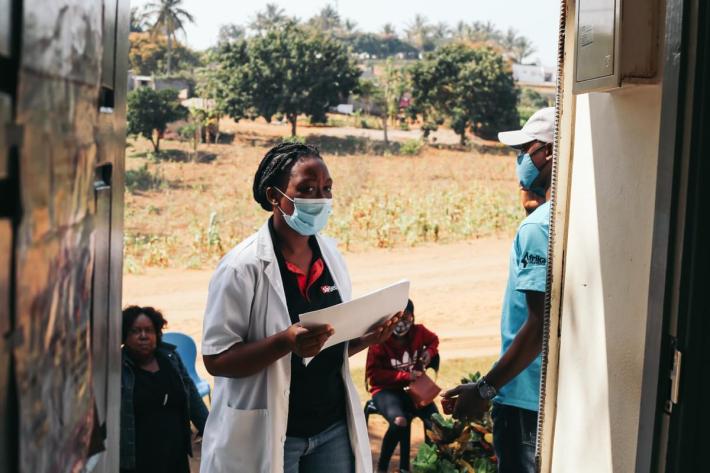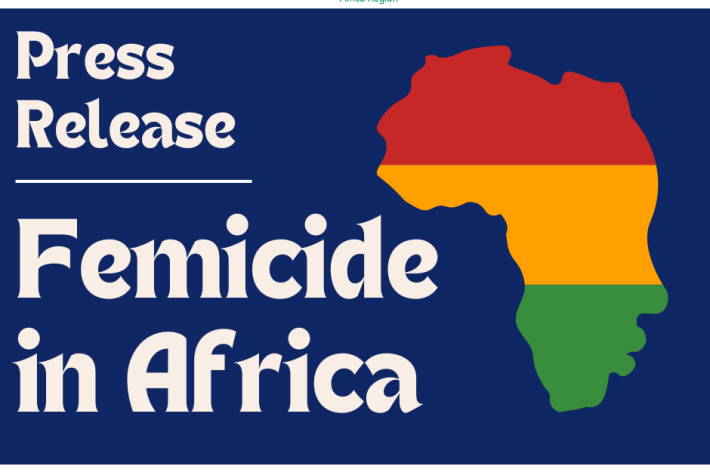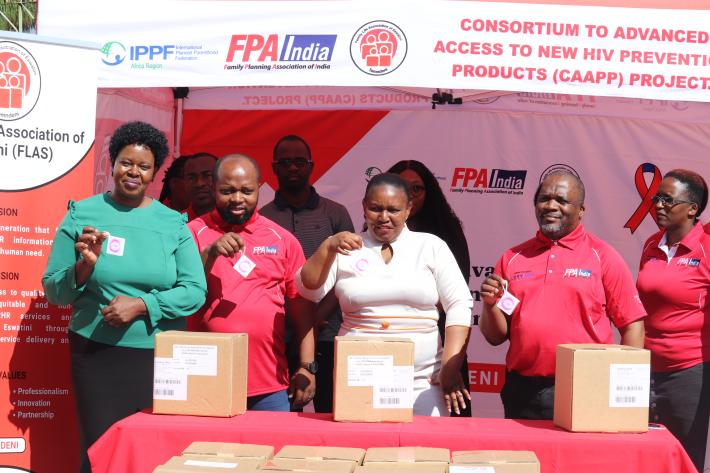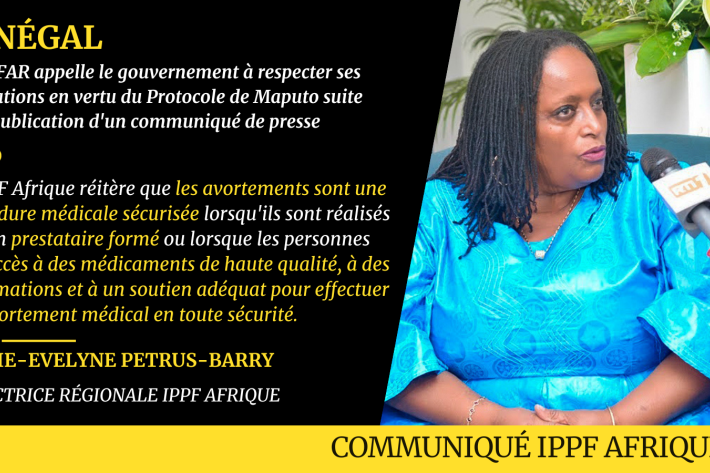Latest press releases
A selection of stories from across the Federation
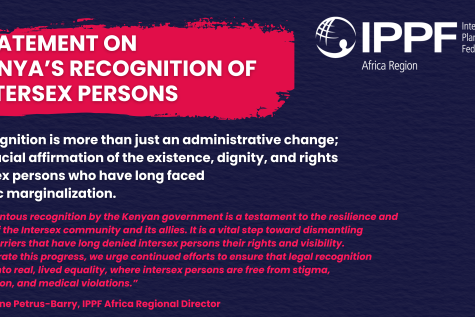
Kenya
IPPF Africa Region Welcomes Kenya’s Landmark Recognition of Intersex Persons
IPPF Africa Region Welcomes Kenya’s Landmark Recognition of Intersex Persons Nairobi, Kenya: 13 February 2025 – On 31 January 2025, Kenya has taken a groundbreaking step towards inclusivity and human rights by officially recognizing intersex as a sex marker alongside male and female in the Kenya Legal Notice 153 of 2025.


| 28 July 2022
Statement In Support Of Pregnant School Girls In Tanzania
IPPF Africa Region is concerned about the alleged statement by Tanzanian President HE John Pombe Magufuli. The warning that schoolgirls who have given birth should not be allowed to return to school is contrary to Regional and Global policy commitments that seek to protect Africa’s Youth, to which the United Republic of Tanzania is a signatory. The Republic of Tanzania has ratified several protocols at the continental level – and these include the Banjul Protocol, the Maputo Protocol and most recently the Maputo Plan of Action 2016-2030. The Banjul Protocol specifically states in article 17 that ‘Every individual shall have the right to education” and part of article 18 declares that “The State shall ensure the elimination of every discrimination against women; and also ensure the protection of the rights of women and the child as stipulated in international declarations and conventions.” Education is not only a human right in itself, but also enables access to almost all other human rights (UNESCO, 2016). The right to education is enshrined in Article 26 of the Universal Declaration of Human Rights (United Nations, 1948). Equal access to quality education is also an objective of Africa’s Agenda 2063 and the United Nations 2030 Agenda for Sustainable Development. When a girl is not enrolled, or is pulled out of school for any reason whatsoever, her rights are violated, her opportunities are lost and her future options are limited. In light of the above, we would like to appeal to the government of the United Republic of Tanzania to review its overall position on the status of the girl child in the context of the Demographic Dividend, Maputo Plan of Action, Maputo Protocol and the African Youth Charter. We firmly believe that Africa can harness the Demographic Dividend through investing in youth, particularly young girls if their rights are preserved.

| 26 June 2022
U.S Supreme court overturns Roe v. Wade in biggest blow to women's health and rights in recent history
Nairobi – 25 June 2022 – The decision by the US Supreme Court to overturn the landmark Roe V Wade on abortion will trigger total or near total bans on abortion care in approximately 26 states across the United States of America. This decision not only affects the United States but undoubtedly we will see a ripple effect across the world. Overturning Roe v. Wade is the biggest blow to women's health and rights in recent U.S history. It removes 50 years of safe and legal abortion across the U.S. and puts the lives of millions of women, girls and gender diverse people into the hands of state legislators – many of whom are Conservative extremists who are anti-woman, anti-LGBTI+ and anti-gender. By continuing this attack on women's bodies and forcing them to carry pregnancies to term, the highest court in the United States has reached its lowest point, robbing millions of their liberty, bodily autonomy and freedom - the very values the United States prides itself on. The decision is also out of step with the America people, the majority of whom support access to abortion care. "The fallout from this calculated decision will also reverberate worldwide, emboldening other anti-abortion, anti-woman and anti-gender movements and impacting other reproductive freedoms. The justices who put their personal beliefs ahead of American will, precedent and law will soon have blood on their hands, and we are devastated for the millions of people who will suffer from this cruel judgment", said Dr Alvaro Bermejo, Director of the International Planned Parenthood Federation. “We know from our experience in sexual and reproductive health and rights that extremist groups and lawmakers opposed to gender equality have fought long and hard to control women’s and girls’ bodies. These groups play politics with the bodily integrity of women and girls, denying scientific findings and challenging well-grounded evidence that banning abortion does not stop women from choosing to have the procedure, only forcing them to turn to potentially dangerous alternatives. These groups also force health care providers to choose between saving a woman’s life and facing criminal charges. There is no such thing as preventing abortion; there is only banning safe abortion”, said Marie-Evelyne Petrus-Barry, International Planned Parenthood Federation, Africa Region (IPPFAR) Regional Director. She further added that “while the US may be regressing and rolling back on the human rights of women and girls, we now look to other countries including Benin and Kenya, which have recently signalled their commitment to protecting and fulfilling the rights of women and girls to access safe abortion care. These countries now lead the charge, and we as global voices in reproductive rights worldwide, must continue working hard to make these rights a reality, while maintaining and building on them.” END Media Contacts: Mahmoud Garga, Lead Specialist - Strategic Communication, Media Relations and Digital Campaigning, IPPF Africa Regional Office (IPPFARO) – email: [email protected] -Phone +254 704 626 920 ABOUT IPPF AFRICA REGION (IPPFAR) The International Planned Parenthood Federation Africa Region (IPPFAR) is one of the leading sexual and reproductive health (SRH) service delivery organization in Africa, and a leading sexual and reproductive health and rights (SRHR) advocacy voice in the region. Headquartered in Nairobi, Kenya, the overarching goal of IPPFAR is to increase access to SRHR services to the most vulnerable youth, men and women in sub-Saharan Africa. Supported by thousands of volunteers, IPPFAR tackles the continent’s growing SRHR challenges through a network of Member Associations (MAs) in 40 countries. We do this by developing our MAs into efficient entities with the capacity to deliver and sustain high quality, youth focused and gender sensitive services. We work with Governments, the African Union, Regional Economic Commissions, the Pan-African Parliament, United Nations bodies among others to expand political and financial commitments to sexual and reproductive health and rights in Africa. Learn more about us on our website. Follow us on Facebook, Twitter, Instagram and YouTube.

| 30 May 2022
Opinion: Stepping up to contain the Roe v. Wade shock wave in Africa
On May 2, a leaked draft opinion from the U.S. Supreme Court hinted at a likely overturning of the landmark 1973 decision in the case of Roe v. Wade, which effectively legalized abortion across all U.S. states and allowed women to choose to have the procedure without excessive government restriction. Fifty years later, this latest attack on reproductive freedoms could have ripple effects across the U.S. and the rest of the world. Access to abortion care is a human right, essential for guaranteeing the health and reproductive rights of women and girls everywhere. While the U.S. may be regressing and denying the human rights of women and girls, we now look to countries such as Benin and Kenya, which have recently signaled their commitment to protecting and fulfilling the rights of women and girls to access abortion care. Read the rest of this article here, as published by Devex.

| 13 May 2022
Stepping up to contain the Roe v Wade shock wave in Africa: Marie-Evelyne Petrus-Barry and Nelly Munyasia
By Marie-Evelyne Petrus-Barry and Nelly Munyasia. Last month, the High Court of Malindi in Kenya ruled that abortion care is a fundamental right under the Constitution of Kenya and that arbitrary arrests and prosecution of patients and healthcare providers for seeking or offering abortion services is illegal. The High Court further confirmed that criminalizing abortion under Penal Code without Constitutional statutory framework is an impairment to the enjoyment of women’s reproductive right and directed the Parliament of Kenya to enact an abortion law and public policy framework that aligns with the Kenyan Constitution. This incredible result was made possible owing to the efforts of Reproductive HealthNetwork Kenya (RHNK), a network of health professionals within private and public facilities committed to comprehensive sexual reproductive health and rights (SRHR), advocacy, and service provision, and the Centre for Reproductive Rights (CRR), a non-profit legal advocacy organization dedicated to promoting and defending reproductive rights worldwide. According to Guttmacher, globally over 120 million unintended pregnancies occurred each year between 2015 and 2019, 61% of which ended in abortion. In countries that restrict access to abortion, the percentage of unintended pregnancies ending in abortion has increased over the past 30 years, from 36% in 1990–1994 to 50% in 2015–2019. Last week, a leaked draft opinion from the United States (US) Supreme Court hinted at a likely overturning of the 1973 landmark Supreme Court decision in Roe V Wade which effectively legalized abortion across all US states. When Roe V Wade was passed some 50 years ago, it set the standard for progressive laws worldwide allowing women to choose to have an abortion without excessive government restriction. 50 years later, the possibility of retrogressing this constitutional commitment in the US and in the rest of the world is looking more likely than ever. Such a decision would de facto open the floodgates of arrests and prosecution of patients and healthcare providers seeking or offering abortion services both in the United States and across the world. Such a move from a global power would also give grist to the anti-abortion mill worldwide, granting anti-abortion groups traction, funding, and legitimacy, and disrupting already scant services and scarce funding to civil society organisations that support the right to abortion care. In 2020, an investigation by the media organisation, Open Democracy, revealed that US right wing funding was behind “pregnancy crisis centres” which claim to provide “advice” to pregnant women but really advocate against termination of pregnancy and the right to abortion care. Moreover, if anti-abortion groups increase or expand, sexual and reproductive health and rights networks will have to redirect their energy towards stopping harmful reproductive coercion against women’s or couples’ will instead of focusing efforts on holding their governments accountable to expanding access and implement existing abortion legislation efficiently. While lawmakers have made progress in parts of the world, they have walked back on the advances made in others. They deny the science and play politics with women’s bodily integrity challenging well-grounded evidence that banning abortion does not lead to fewer women seeking or opting for abortions; and regrettably forcing women who want to safely end a pregnancy to turn to dangerous alternatives. They also oblige healthcare providers to choose between saving a woman’s life and facing criminal charges and jail time. As evidence demonstrates, there is no such thing as prohibiting abortion. There is only banning safe abortion. Fundamental reproductive rights are under attack by anti-gender and anti-rights extremists, guised in lawmakers’ cloaks. We know from our experience of working on ensuring sexual and reproductive health and rights (SRHR), in Kenya and in the rest of the world, that anti- rights and anti-gender opposition groups have fought long and hard to control women’s bodies and deny them their reproductive rights. Nelly Munyasia- Executive Director Reproductive Health Network Kenya (RHNK). “As a service providing organisation, we have faced numerous challenges including provider arrest, harassment and extortion by the police. We have witnessed the opposition targeting and threatening our providers including protesting in front of their clinics and launching hateful online petitions. This development in the US is moving us backwards and taking away women’s rights, reducing their ability to achieve their full potential in society. It will also have economic implications for decades to come. This equally puts health care providers at risk of violence and abuse by the opposition, and harassment by the police.” Marie-Evelyne Petrus-Barry, Africa Regional Director, International Planned Parenthood Federation of whom RHNK is a collaborative partner added: "Access to abortion care is a human right, essential to guarantee the health and reproductive rights of women and girls everywhere. At IPPF, we are committed to reducing the number of deaths of women and girls who are forced to turn to unsafe abortion methods for fear of arrests and harassment. In partnership with our Collaborative Partner, RHNK and other powerful voices in the region and beyond, we will continue to supply and support safe and legal abortion services and care for women and girls everywhere, challenge regressive laws and protect the rights of women and girls to have autonomy over their own bodies, including to safely end a pregnancy if they so wish." Now more than ever, we must take a stand against this erosion of a woman’s fundamental right to her own bodily autonomy. Working in silos is no longer an option. As a global SRHR ecosystem, we must come together, protect past hard-fought wins, mobilise, and strategize to protect women and girls’ rights, including their right to abortion care. **END*** Marie-Evelyne Petrus-Barry is the Africa Regional Director at the International Planned Parenthood Federation (IPPF). Born in Guadeloupe, she has over 30 years of international human rights experience and leads her team to advocate, promote, and deliver sexual and reproductive health and rights in 42 sub-Saharan countries. Her leadership helps ensure that IPPF Africa Region, through locally owned organizations, protects and safeguards the rights of the most vulnerable in society. Nelly Munyasia is the Executive Director at Reproductive Health Network Kenya (RHNK) a network of trained and committed providers ensuring access to quality and comprehensive SRHR. She is a trained nurse-midwife and a health systems expert. Nelly is an award-winning global citizen committed to championing and advocating for quality sexual and reproductive health for women, girls and young people.

| 28 March 2022
High Court Judgement in Malindi Protects Women, Girls and Healthcare Providers from Arbitrary Abortion-Related Arrests and Prosecutions
March 26, 2022 (MALINDI) – In a landmark verdict today, the High Court of Malindi has ruled that safe abortion care is a fundamental right under the Constitution of Kenya and that arbitrary arrests and prosecution of patients and healthcare providers, for seeking or offering such services, is completely illegal. Specifically, the Court ruled that: Abortion care is a fundamental right under the Constitution of Kenya and that arbitrary arrests and prosecution of patients and healthcare providers seeking or offering such services is illegal. Protecting access to abortion impacts vital Constitutional values, including dignity, autonomy, equality, and bodily integrity. Criminalizing abortion under Penal Code without Constitutional statutory framework is an impairment to the enjoyment of women’s reproductive right For years, women and girls in Kenya have faced sustained and pervasive discrimination hampering their access to seeking reproductive healthcare services; the 1963 Penal Code criminalizes all abortion care, including those allowed under the Constitution 2010, which guarantees the right to healthcare, including access to reproductive health services. The Constitution only permits safe abortion if in the opinion of a trained health professional, there is need for emergency treatment, or the life or health of the mother is at risk/in danger. The court case in question, filed in November 2020, involved PAK, a minor 16 years of age from Kilifi County. PAK experienced complications during pregnancy and immediately sought medical care at a nearby clinic where a trained clinical officer attended to her. Upon examining her, the clinical officer determined that she had lost the pregnancy and proceeded to provide her with essential and life-saving post-abortion care. Policy officers stormed the clinic, in the midst of the treatment, stopping the medical procedure and confiscating PAK’s treatment records. They then proceeded to illegally arrest both PAK and the clinical officer. Both were taken to Ganze Police Patrol Base where PAK was not allowed to access further medical care for the next two days and was forced to sign a statement which was contrary to PAK’s description of the events. The police also forced PAK to undergo another detailed medical examination at Kilifi County Hospital to obtain evidence to prove the alleged offence of abortion. The clinical officer was detained for one week while PAK was remanded to a juvenile remand for more than a month, whilst she and her family sought to secure the cash bail for her release. The Malindi High Court has further directed the Parliament to enact an abortion law and public policy framework that aligns with the Kenyan Constitution. Additionally, the Court has confirmed that communication between a patient and the healthcare provider is confidential, which is guaranteed and protected under the Constitution and other enabling laws, save for where the disclosure is consented to by the patient or is in the public interest in line with the limitations as provided for in the Constitution. In its decision, the Court also ruled that PAK was recovering from medical procedure and police did not have the medical qualifications to determine and confirm that she was medically-fit to leave the clinic, regardless of her admission status at the clinic. Additionally, the Court found that PAK’s arrest was inhuman and degrading, and being a minor, she ought not to have been interrogated without legal representation. Evelyne Opondo, Senior Regional Director for Africa at Center for Reproductive Rights said, “Today’s victory is for all women, girls, and healthcare providers who have been treated as criminals for seeking and providing abortion care. The court has vindicated our position by affirming that forcing a woman to carry an unwanted pregnancy to term or to seek out an unsafe abortion is a gross violation of her rights to privacy and bodily autonomy. Further, the continued restrictive abortion laws inhibit quality improvement possible to protect women with unintended pregnancies.” Nelly Munyasia, Executive Director of Reproductive Health Network Kenya (RHNK), a network of reproductive health providers whose member was the second petitioner in this case, welcomed the court’s decision. “Many qualified reproductive healthcare practitioners continue to be arrested, detained, and prosecuted for providing legal medical care. The court’s decision confirms that prosecution against health providers cannot hold where the prosecution has not established that; the health professional in question was unqualified to conduct the procedure; the life or health of the woman was not in danger or the woman was not in need of emergency treatment,” Ms. Munyasia said. Marie-Evelyne Petrus-Barry, Regional Director from the International Planned Parenthood Federation of whom Reproductive Health Rights Network Kenya is a collaborative partner added: “We are absolutely delighted to hear this news and applaud the High Court of Malindi's ruling confirming that abortion care is a fundamental right under the Constitution of Kenya and that arbitrary arrests and prosecution of patients and healthcare providers for seeking or offering such services is illegal. We are also very pleased to hear that the Court has directed Parliament to enact an abortion law and public policy framework that aligns with the Constitution. This is a victory for women and girls not only in Kenya, but across Africa! Access to quality abortion is essential to guarantee the health and reproductive rights of women and girls everywhere. At IPPF, we are committed to reducing the number of deaths of women and girls who are forced to turn to unsafe abortion methods for fear of arrests and harassment. We will continue to supply and support safe and legal abortion services and care for women and girls everywhere.” The petitioners were represented by the Center for Reproductive Rights advocates Martin Onyango, Head of Legal Strategies for Africa, and Prudence Mutiso, Legal Advisor for Africa. Center fact sheet: “The Impact of the Misalignment Between Kenya’s Constitution and the Penal Code on Access to Reproductive Health Care”

| 04 March 2022
Opinion: It's time to permanently repeal the 'global gag rule'
By Caitlin Horrigan, Marie-Evelyne Petrus-Barry. In January 2021, the global health, human rights, and gender equity communities waited with bated breath for U.S. President Joe Biden to keep his election promises and repeal the harmful Mexico City Policy, also known as the “global gag rule.” The devastating policy had been radically expanded under former President Donald Trump to bar international recipients of any U.S. global health funding from using their own funds to provide abortion care or to engage in counseling, referrals, or advocacy related to it. This version of the global gag rule restricted partnership on roughly $12 billion and impacted a range of lifesaving health care services worldwide, including those related to HIV, maternal health and nutrition, sexually transmitted infections, and vulnerable children. The flip-flopping of U.S. foreign policy with each presidential party change has played politics with the health and lives of people across the globe for nearly 40 years. Perhaps most unfair is the intrinsic neocolonialism of the policy, disproportionately impacting Black and brown women and girls in low-income countries with already limited access to high-quality health services, including safe abortion care. For example, while Africa accounts for 29% of all unsafe abortions, “it sees 62% of all abortion-related deaths,” according to the World Health Organization. January 2022 marked one year since Biden rescinded this harmful and unfair policy. Still, while rescinding is a positive first step, the looming threat of reinstatement under future anti-rights administrations continues to undermine the sustainability of global health programs and the pace of progress. More than this, the devastating consequences of the global gag rule do not simply go away. Research from 26 African countries found that during former President George W. Bush’s administration, the global gag rule eroded access to vital sexual and reproductive health care, leading to a 14% reduction in modern contraception use and a staggering 40% rise in abortions among countries highly affected by the policy. Many of these abortions were likely to be unsafe, with potential consequences including lifelong disabilities or even death. Under Trump’s reinstatement of the global gag rule, Ugandan health facilities with more exposure to the policy supported an average of four fewer community health workers than facilities with less exposure to the rule. Such gaps have decreased access to family planning services and the crosscutting health services delivered alongside them. With approximately 218 million women in low- and middle-income countries having an unmet need for family planning and tens of millions of unsafe abortions already performed each year, the sharp decline in sexual and reproductive health care under the global gag rule only adds to disastrous yet sadly preventable outcomes. For the International Planned Parenthood Federation, the global gag rule under Trump meant losing critical support from the U.S. government, impacting 53 health care projects across 32 countries. In some member associations, service delivery decreased by up to 42% from 2016 to 2017, and it will take years to build back to the same capacity. For IPPF’s member association in Mozambique, known by the abbreviation AMODEFA — a national provider of sexual and reproductive health care in the country since 1989 — the impact of the global gag rule meant a $2 million gap in funding, representing about 60% of its total budget. The impact was almost instantaneous, forcing the closure of six programs across 12 districts in Mozambique. This denied nearly 390,000 clients access to services related to contraception, STIs, HIV, malaria, and tuberculosis. Almost every local population was affected, with closures impacting adolescents, youths, women, and marginalized populations. But now, the U.S. Congress has a golden opportunity to change the status quo and permanently repeal the global gag rule, with a supportive White House and the policy change having passed the House of Representatives and enjoying bipartisan support in the Senate. Building on Biden's action, on March 8 lawmakers can finalize and pass language to permanently repeal the policy as part of the fiscal year 2022 spending bill, which also includes increased funding for international family planning programs and the United Nations Population Fund, the U.N. sexual and reproductive health agency. Permanently repealing the global gag rule would positively transform the health and lives of millions of people worldwide. By preventing the flip-flopping of U.S. foreign policy from controlling access to lifesaving health care services, unintended pregnancies would decrease worldwide, the number of unsafe abortions would be reduced, maternal and child deaths would be prevented, and more girls could stay in school. Ending the global gag rule is also popular, and polling undertaken by the Garin-Hart-Yang Research Group shows that 70% of Americans support it. Alongside them, permanent repeal is supported by over 150 diverse organizations in the U.S. working across the health care, human rights, and gender equality sectors, with further support from around 200 global organizations from dozens of countries across six continents. The global gag rule is a callously designed political tool set up to deny women, girls, and marginalized people the right to decide what happens to their bodies. By permanently repealing the policy and standing up for the futures of millions, the U.S. will leave a legacy that gives hope and stability to the health and rights of people worldwide. And for those affected by this awful policy, change can't come soon enough. Read the original article on Devex. Marie-Evelyne Petrus-Barry is the Africa regional director at the International Planned Parenthood Federation. Born in Guadeloupe, she has over 30 years of international human rights experience and leads her team to advocate, promote, and deliver sexual and reproductive health and rights in 42 sub-Saharan countries. Her leadership helps ensure that IPPF Africa Region, through locally owned organizations, protects and safeguards the rights of the most vulnerable in society. Caitlin Horrigan is the director of global advocacy at Planned Parenthood Federation of America. With over a decade of foreign policy experience, Caitlin drives PPFA’s global advocacy agenda with the U.S. Congress and administration to protect and expand funding and policies that advance sexual and reproductive health and rights worldwide.











